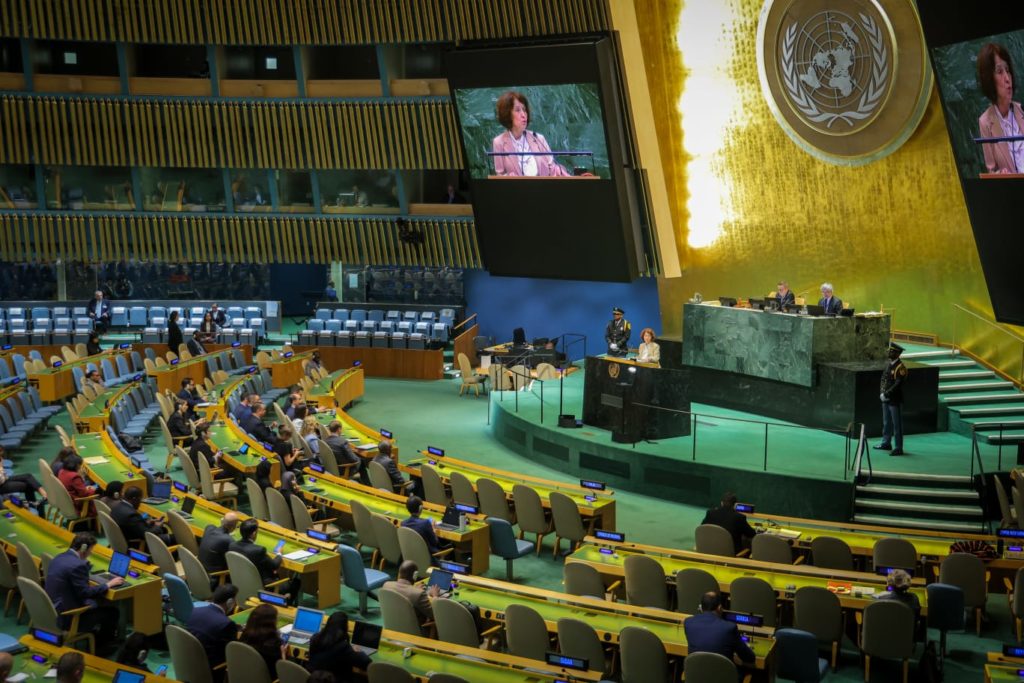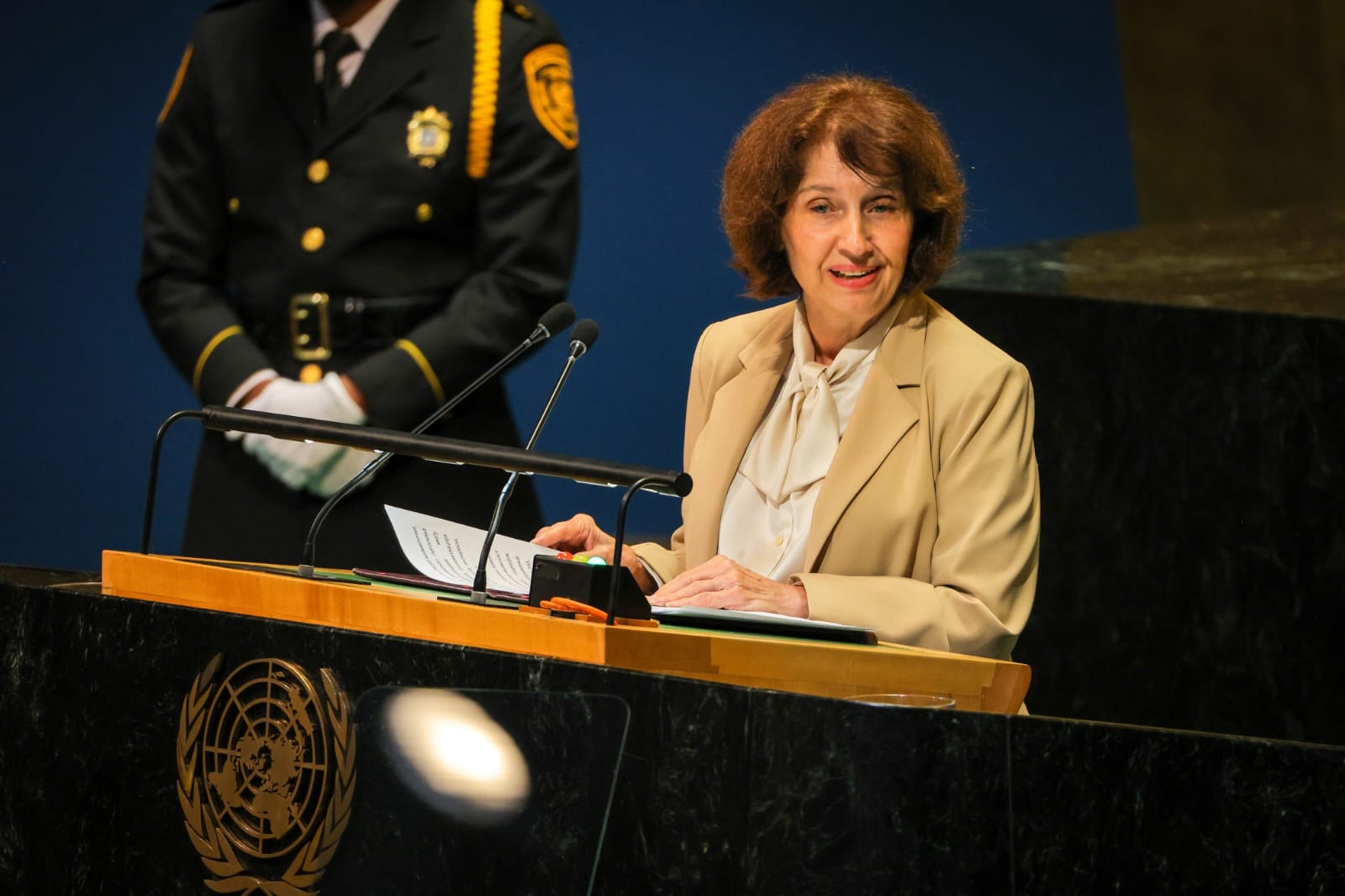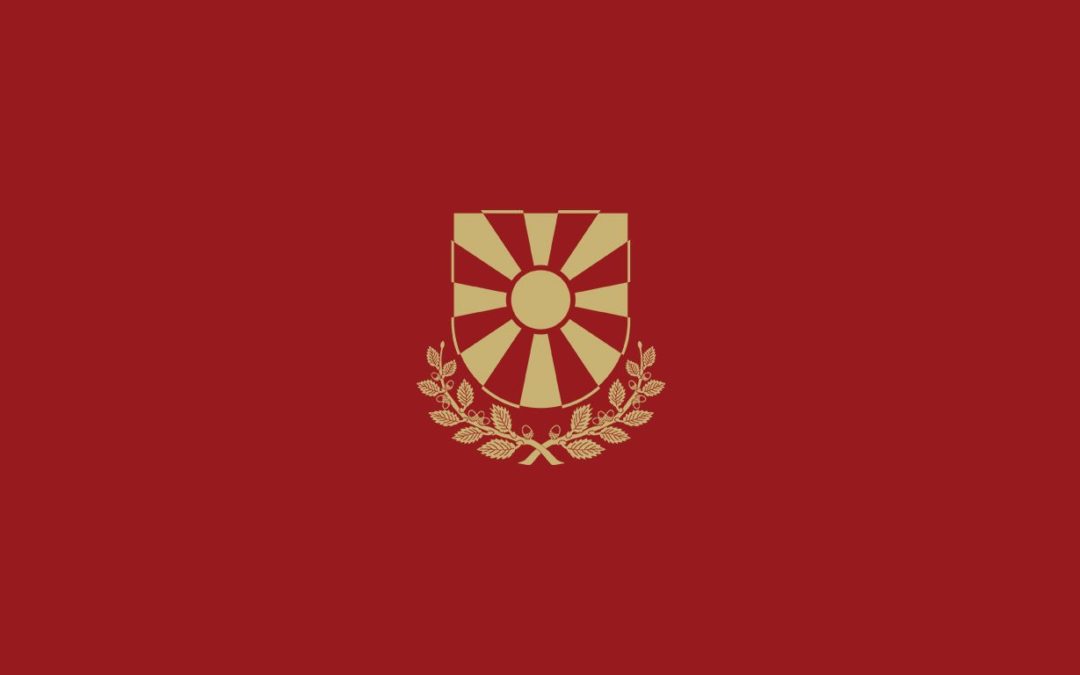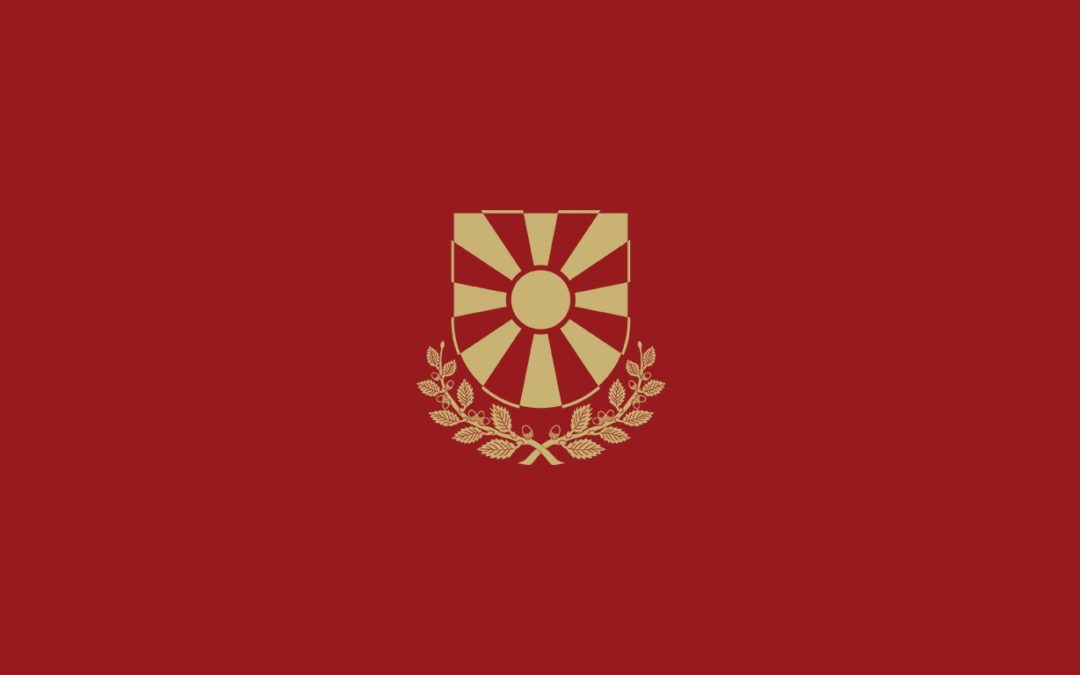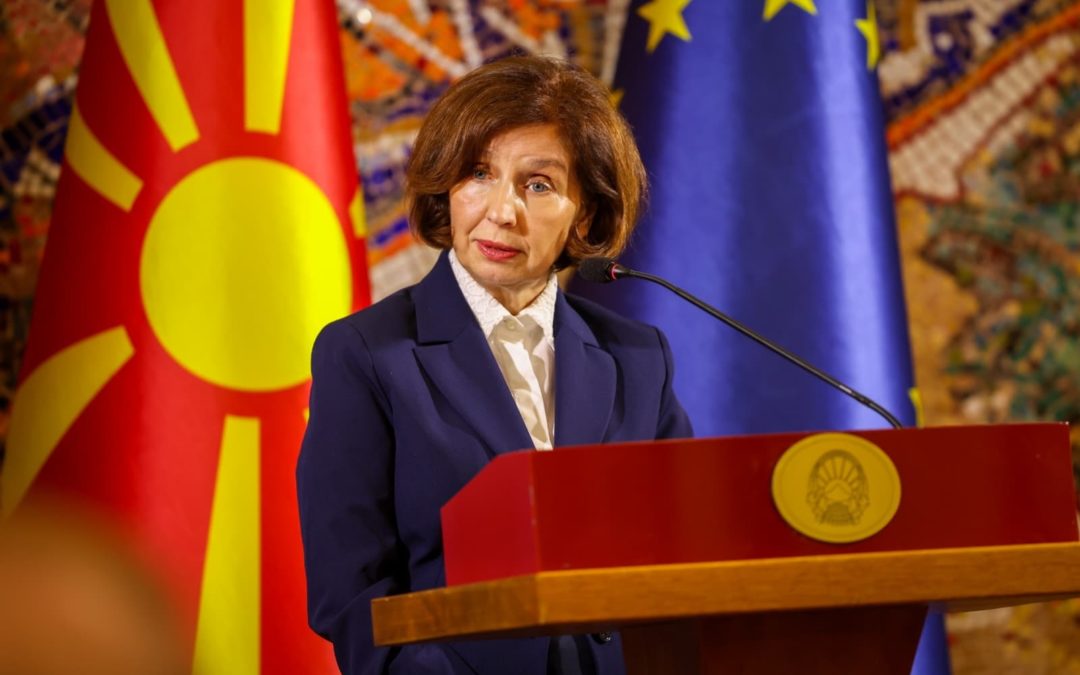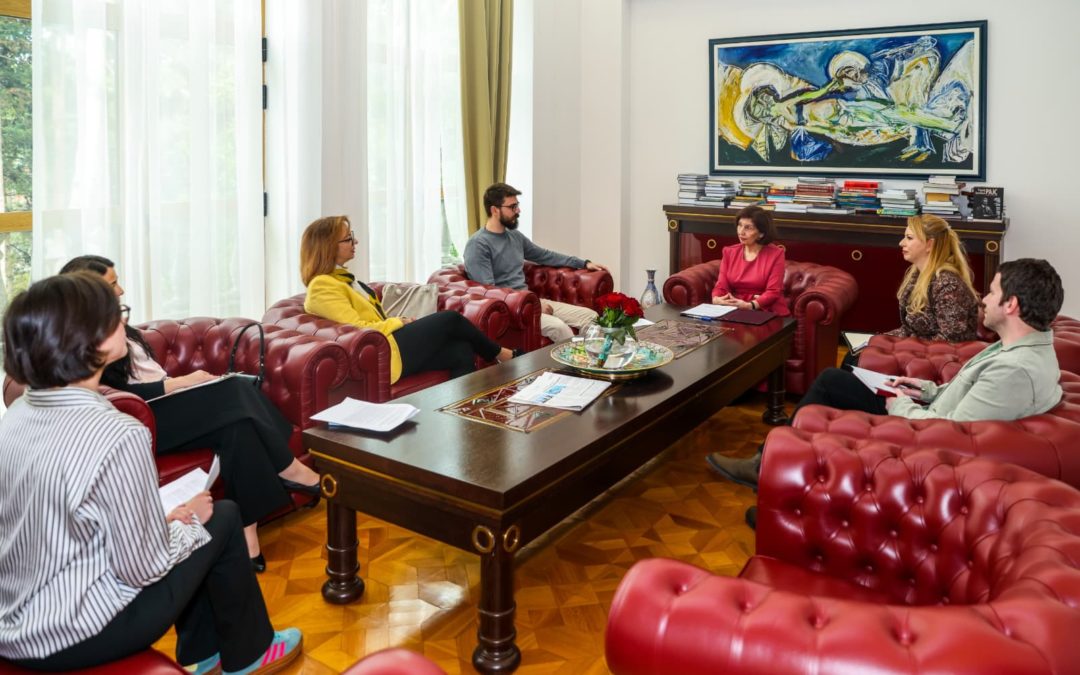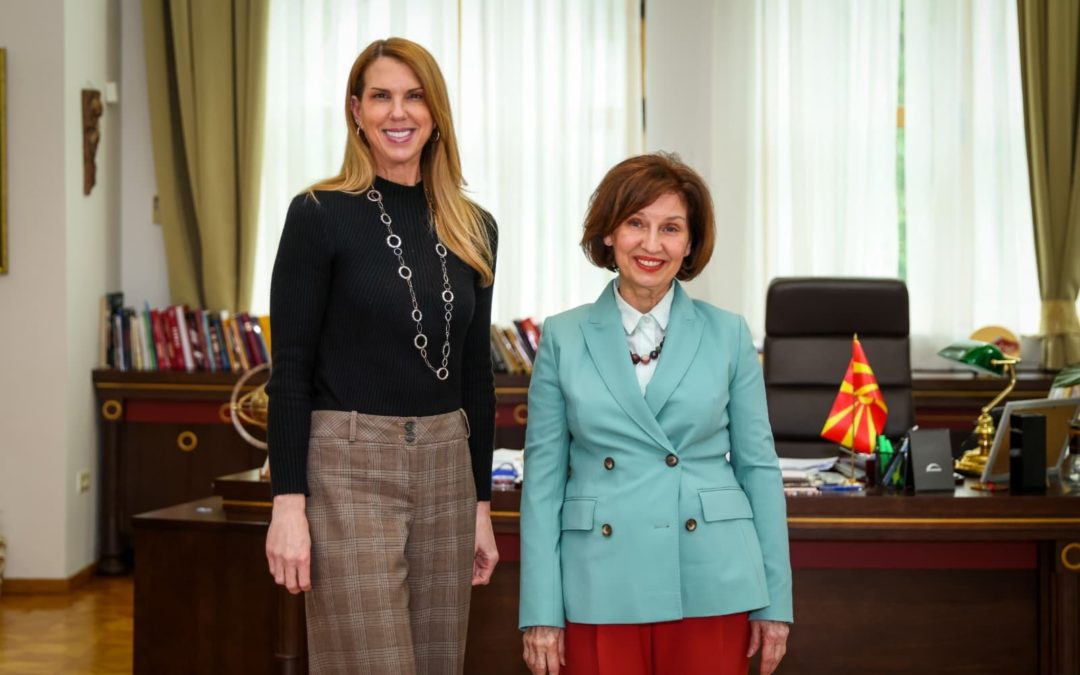President Gordana Siljanovska-Davkova addressed the general debate of the 80th Session of the United Nations General Assembly in New York today.
Below is the integral text of her address:
Honorable Madam President of the United Nations General Assembly, Annalena Baerbock,
Distinguished Secretary-General of the United Nations, Mr. Guterres,
Esteemed Excellencies,
Ladies and Gentlemen,
Being the foundation of international law and multilateralism, the United Nations have prevented another world war and numerous conflicts and have alleviated the consequences of many humanitarian crises. They have helped many nations embark on the path to sovereign equality, lifted millions out of extreme poverty and educated entire generations. They have inspired a global movement for rights and freedoms, for social justice and equality. They have raised awareness of environmental protection and mobilized humanity in the fight against climate change. For these and many other achievements, the United Nations, its agencies and leaders, have won no less than 12 Nobel Peace Prizes.
Nevertheless, the United Nations today face a geopolitical and geo-economic earthquake that is shaking the very foundations of the post-World War II order. Today’s crises steam from deep tectonic shifts undermining the principles that shaped the world for the past 80 years.
A new geopolitical era is emerging before our eyes. Instead of acting together on the urgent challenges such as peace and security, climate change and environmental destruction, artificial intelligence and growing inequalities, we seem to be heading toward a post-Hobbesian state of war of everyone against themselves. Instead of a single international order, parallel orders seem to be emerging, each with its own rules, values and interests, often directed against one another.
Being paralyzed and isolated when most needed, I wonder if the United Nations is turning into the League of Nations.
The signs are all around us. Instead of creating a sense of shared future, humanity is facing wars and loss of humanness. With international humanitarian law increasingly ignored, hunger is weaponized and humanitarian workers are targeted. Amid everyday violence the world is oscillating between nihilistic pessimism and hedonistic escapism, between hopeless lamentation and heartless indifference, as in the first decades of the 20th century.
The tremors of the international order have opened deep geopolitical faultlines. One of the most active is in Ukraine, where war has been raging for three and a half years. Russia’s aggression is a flagrant violation of the Charter of the United Nations and a direct threat to international peace and security.
We also express our deep concern over the recent violations of the airspace of Poland, Romania and Estonia, every one of them a NATO member state. We supported the Joint Statement of September 12th and call for immediate de-escalation, full respect for international law and use of preventive diplomacy to reduce tensions and preserve peace.
Your Excellencies,
The geopolitical faultline also runs through the Western Balkans region. The Macedonian accession process to the European Union has been continuously obstructed for 20 years, but not on the basis of the objective Copenhagen criteria, but for subjective, nationalist reasons. The latest EU condition to start our negotiations is a new, imposed amendment to the Constitution.
The Constitution, lex superior and, in Rousseau’s sense, a social contract between citizens, represents the most internal matter of any state. Our Constitution provides four initiators of amendments: the President of the Republic, the Government, at least 30 members of Parliament, and 150,000 citizens. It is clear that neither our neighbors nor the European Union are authorized proposers of amendments.
We emphasize that conditioning the start of negotiations to new constitutional amendments once again reopens issues of history, culture, and language, questions we had been assured were settled by the Prespa Agreement with Greece.
We are constantly reminded that agreements must be respected: pacta sunt servanda. I consent but the Treaty of Friendship, Good-Neighborliness, and Cooperation with Bulgaria contains no provisions for constitutional amendments.
Finally, through its constitutive acts, the EU defines itself as a “unity of diversity” and commits to respecting “cultural and linguistic diversity,” “national and cultural identity,” and “dignity and integrity.” How, then, is it possible that we are asked to discuss and negotiate with a neighbor about our history, culture, and language?
Time and again, we stress that we perceive ourselves as Europeans and deeply believe in the European project that brought peace and economic prosperity after the Second World War. The European ideal remains our greatest inspiration and strategic aspiration. As a country dedicated to good neighborly relations and regional cooperation, we do not seek disputes with our neighbors. What we desire is to be integrated into the Union, but without additional and special conditions and with national dignity preserved.
We warn that after the war in Ukraine, the blocked European integration of the Western Balkan is not only a political, but also a security issue. With the political door closed for the Western Balkan countries and the door wide open for influence of third geopolitical centers of power, it is ironic that the Union calls for resilience towards them.
Must we end up on the Security Council’s agenda for the EU to unblock our enlargement? If the European Union wants to be a geopolitical union, it must not leave the Western Balkans in a geopolitical vacuum.
As the President of the European Commission noted, the European Union must break the armor of consensus as soon as possible if it wants to complete the reunification of Europe and become a strong geopolitical factor again.
Madam President,
Esteemed Excellencies,
Finally, I cannot but address one of the most geopolitically volatile regions: the Middle East and Gaza.
The Middle East has an ancient and rich tradition of interreligious and interethnic coexistence. History has shown that diversity, when respected, can be a source of cultural enrichment and long-term peace. But, also, history teaches that violence, regardless of its origin, deepens divisions, prolongs human suffering and distances the parties from a just and comprehensive solution. We are convinced that sustainable peace in the Middle East can only be achieved through dialogue and diplomacy, in accord with international law. The inviolability of human life and dignity must be respected, even in times of war, in accord with international humanitarian law. In that spirit, we reaffirm our support for international efforts aimed at de-escalation, inclusive dialogue and direct negotiations.
Esteemed Excellencies,
These geopolitical faultlines and tensions point unequivocally to the following: without multilateral institutions and procedures, without international law and principles that would tame the strong and protect the weak, we will re-enact the Thucydides’ Melian dialogue, with the strong doing, unfortunately, what they can and the weak what they must.
Consider how repeated violations of the United Nations Charter were tolerated, clearing the path for new ones. Remember the General Assembly resolutions left unenforced, the International Court of Justice’s judgments disregarded and its opinions ignored, and the peace initiatives obstructed in the Security Council.
Facing with the dysfunction of the current international order, some realists advise forgetting international treaties and conventions as a needless burden and seeking shelter in regional blocs and alliances. For them, the fastest and best way to resolve crises is outside the United Nations, without a Security Council mandate. However, departing from universal principles and mechanisms in favor of pragmatic opportunism and reaching for ad hoc measures pushes us toward an uncertain future of growing geopolitical and geoeconomic competition, and even confrontation in the race for resources.
Is that the harsh world we mean to leave to our posterity?
The alternative is to try to revitalize multilateralism and make its institutions more resilient to these systemic shocks.
Ladies and Gentlemen,
Respected Attendees,
Young generations have the right to a renewed Charter, to a reformed and strong United Nations that will enable them to live in peace among nations and peace with nature.
These reforms must not be cosmetic, but profound, to enable greater inclusiveness, harmonization between values and mechanisms, optimization of national and global interests, and functional institutions.
UN reforms depend on whether they are seen as an opportunity to renew the rules-based international order, or as a challenge to the privileges of some member states. Yet, what is the point of being a privileged member state of a dysfunctional, irrelevant, marginalized international organization?
For effective United Nations, it is necessary for the Security Council to be reformed, to be more inclusive, accountable and responsible for maintaining international peace and security. The General Assembly must evolve into a representative policymaking body, rather than a debate club. The implementation of International Court of Justice judgments must become mandatory for all member states, ensuring the rule of law.
Reform is needed not only for old challenges but also for new ones. Artificial intelligence brings enormous opportunities, but also incalculable risks for our civilization. It is not just a technological leap. Its impact may be greater than the industrial and digital revolutions. Aware of this, my country and I support the proposal to make artificial intelligence a priority of the 80th Session.
Next year, we will elect a new Secretary-General of the United Nations. We need a person with leadership skills, with rich diplomatic experience and ability to bridge differences and build consensus, but also deeply humane and committed to the vulnerable. The next top diplomat of the world must possess much knowledge, patience, and tact. After 80 years, it is high time for a woman to be Secretary-General of the United Nations. In a world dominated by strong men, often with weapons, we need strong women with wisdom and empathy. I believe that women, who, along with their children, are the greatest and most numerous victims of wars, have an inalienable right and obligation to prevent them.
The anarchic international order is a threat to all, but especially to small states. It is natural for small and medium-sized states to be the greatest supporters of United Nations reforms.
Distinguished Excellencies,
Let me share with you what we are doing in this regard. We supported the adoption of the Pact for the Future as a new global social contract.
Living in one of the most climate-vulnerable regions in the world, the Mediterranean, Macedonian citizens are already experiencing the consequences of the climate crisis, such as extreme weather conditions. That is why we supported the implementation of the Paris Agreement at COP29 in Baku.
We supported the “Seville Commitment” on financing for development and integrated the Sustainable Development Goals into our National Development Strategy 2024-2044.
At the 3rd UN Ocean Conference in Nice, we committed to strong international ocean governance, supporting the Action Plan.
We are making great efforts to promote women’s leadership and the implementation of the agenda on women, peace and security.
We signed the new 2026-2030 Framework for Cooperation with the United Nations, to ensure inclusive social and human development, sustainable economies and decent work, resilient and green societies and ecosystems, the rule of law and good governance.
Ladies and Gentlemen,
We are standing in front of a great test: either we will guarantee an international order based on visionary principles, or we will rush towards a catastrophe of unimaginable proportions for humanity.
Former Secretary-General Dag Hammarskjold reminded us that “the United Nations was not created in order to bring us to heaven, but in order to save us from hell. […] We should recognize the United Nations for what it is – an admittedly imperfect but indispensable instrument of nations in working for a peaceful evolution toward a more just and secure world order.” Let’s give them that chance.
Thank you.
